The best puppy food for allergies does more than fill a bowl. It supports health, soothes sensitive stomachs, and fits your budget. If your puppy has itching, digestive issues, or skin irritation, their food might be the problem.
Finding the right diet can greatly improve their comfort and growth. But with many choices available, how do you find what’s safe and effective? In this post, we’ve gathered the best allergy-friendly puppy foods.
These options are gentle on sensitive pups and easy on your wallet. Whether you want grain-free, limited-ingredient, or vet-approved recipes, these foods offer a great mix of nutrition, safety, and affordability.
Grain-Free Kibble
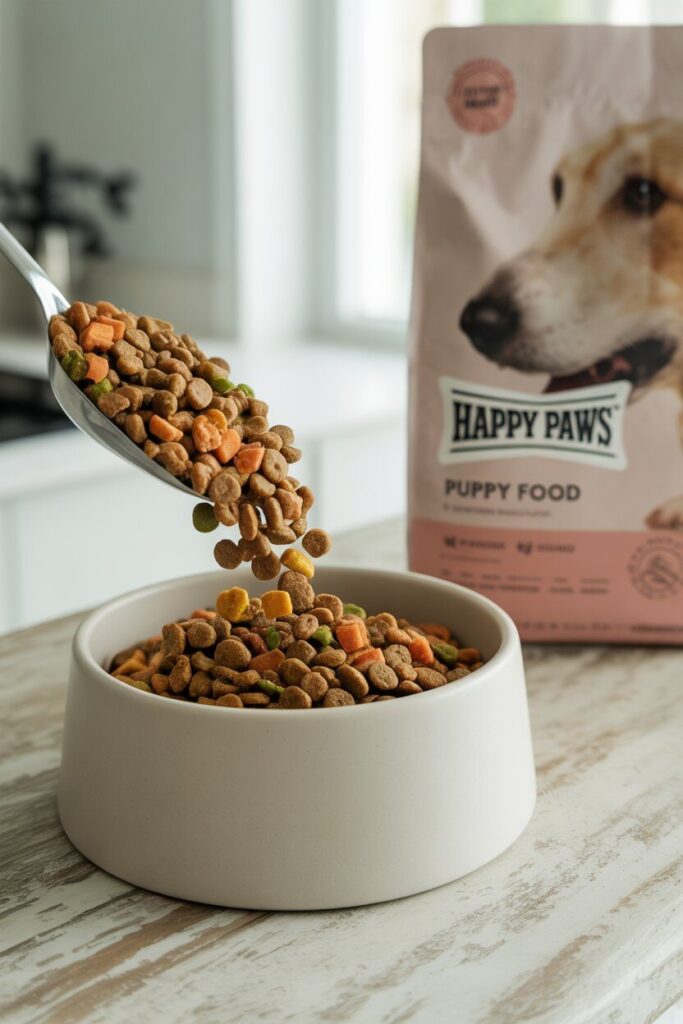
Grain-free kibble is a smart choice for puppies with allergies. Instead of grains, these kibbles use sweet potatoes, which are gentler on their digestion.
Many grain-free kibbles feature quality proteins like chicken or fish. These proteins are vital for growth and help build strong muscles and bones.
Choosing grain-free kibble can boost a puppy’s overall health. These foods often have fruits and vegetables that offer essential vitamins and minerals for a balanced diet.
Treat your pup to wholesome comfort with grain-free kibble options available now on Amazon
Limited Ingredient Diets
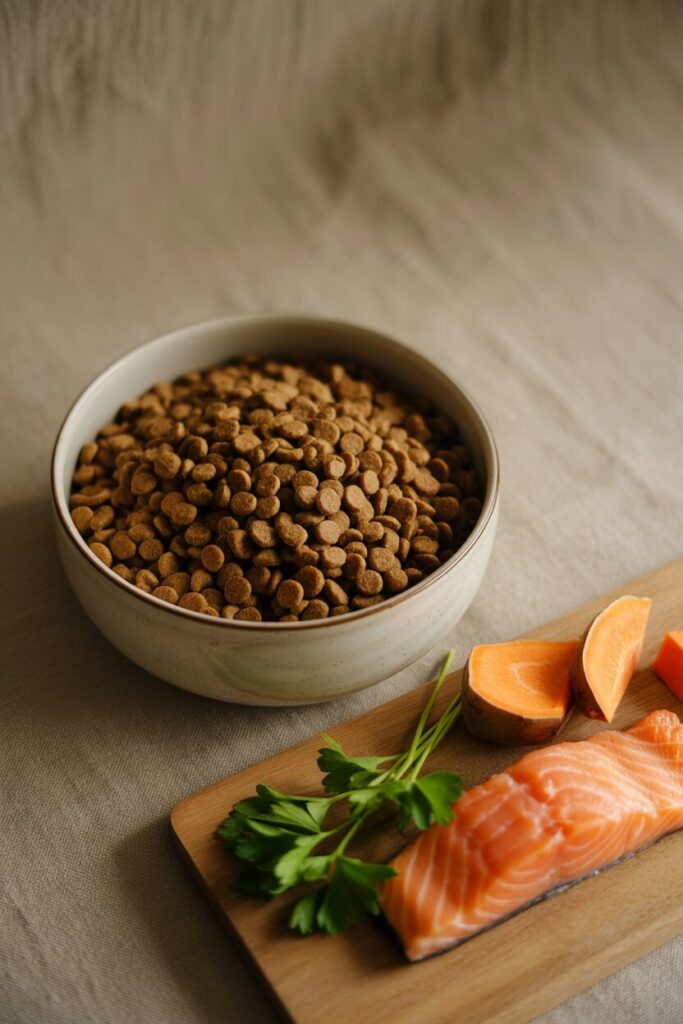
Limited ingredient diets use fewer ingredients to lower allergy risk in puppies. These diets help identify and avoid allergens, keeping your puppy healthy and happy.
One benefit is the use of high-quality, easy-to-digest proteins. This helps manage allergies and supports your puppy’s growth.
When choosing dog food for puppies, look for a limited ingredient diet with one protein and one carbohydrate source. This simple approach helps find food sensitivities and ensures proper nutrition for your puppy.
Keep mealtime simple and safe with limited ingredient dog foods that you can easily find on Amazon
Hypoallergenic Options
Hypoallergenic dog foods are made to lower common allergens. They are great for puppies with food sensitivities. These foods often use ingredients that are less likely to trigger allergies. This helps keep your puppy healthy and comfortable.
For puppies with allergies, hypoallergenic dog food can be a big help. By avoiding common allergens like wheat, soy, and dairy, these foods reduce the chance of allergic reactions. This allows your puppy to grow without discomfort.
Choosing the right dog food for sensitive puppies can be tough. Hypoallergenic options usually include novel proteins like duck or venison. They also lack artificial additives, offering a balanced diet while lowering allergy risks.
Soothe your puppy’s sensitivities with gentle, hypoallergenic formulas available on Amazon
Fish-Based Recipes
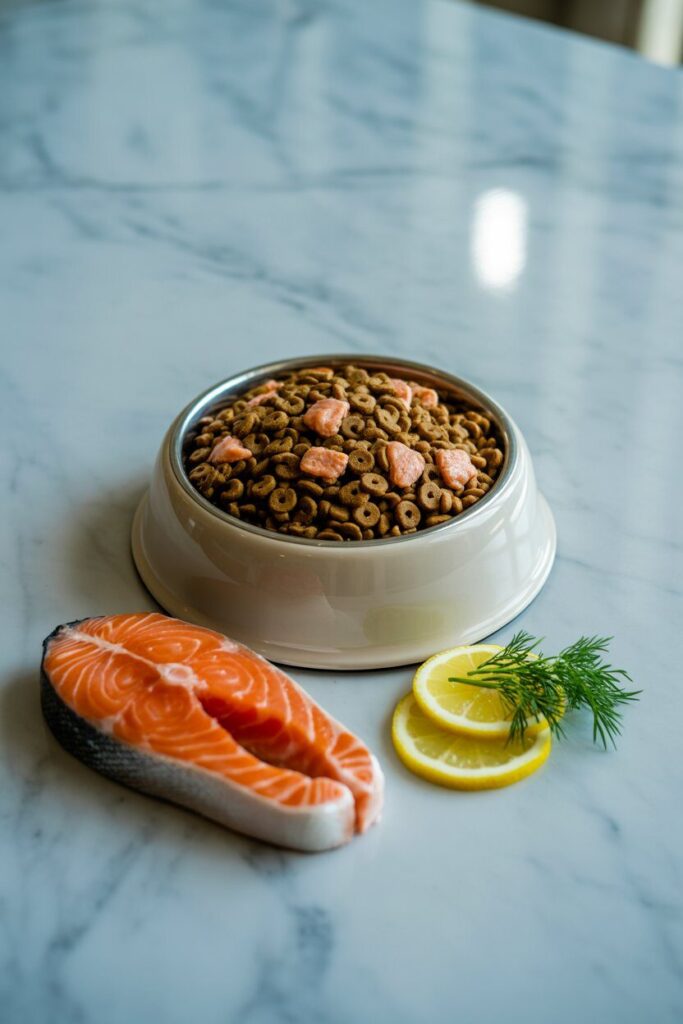
Fish-based dog foods are ideal for puppies. They are easier to digest, which means less tummy trouble. This helps your pup absorb nutrients better, promoting strong growth.
Many puppies are allergic to common proteins like chicken and beef. Fish recipes can lower these allergic reactions, making them safer for sensitive pups.
Fish is rich in omega-3 fatty acids. These are vital for brain development and a shiny coat. Adding fish to your puppy’s diet supports their overall health and well-being.
Give your furry friend a taste of the ocean with nutritious fish-based recipes found on Amazon
Novel Protein Sources

Using unique proteins like duck or venison in dog food can help with allergies. These proteins are less common. This reduces the chances of allergic reactions in puppies sensitive to chicken or beef.
Switching to novel protein sources can also benefit your puppy’s digestion. Duck and venison are easier on sensitive stomachs. This promotes better digestion and overall well-being.
Incorporating novel proteins into your puppy’s diet adds essential nutrients. Duck and venison have different amino acid profiles than common meats. This supports your puppy’s growth and development.
Discover unique protein blends that help minimize allergies by exploring novel protein foods on Amazon
Organic Choices
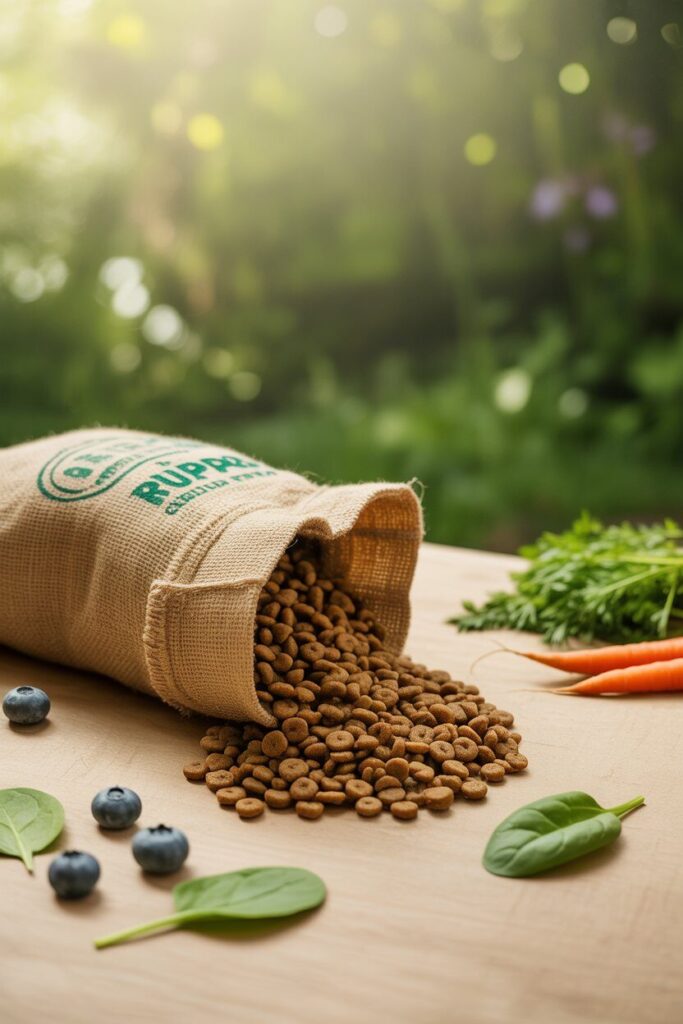
Organic dog food is easier for puppies to digest. It often has fewer artificial ingredients. This can reduce stomach issues and make mealtime more enjoyable for your pup.
Choosing organic dog food may lower allergic reactions in puppies. With fewer chemicals and additives, these foods are less likely to cause skin irritations or other allergic responses. This helps keep your puppy healthy and happy.
Organic dog food usually includes higher quality ingredients. These foods use natural sources of vitamins and minerals. This supports your puppy’s growth and development, providing a solid foundation for a long, healthy life.
Choose pure nutrition with organic puppy foods crafted for allergy-sensitive dogs, available on Amazon.
Raw Diets
Raw diets offer a natural way to manage dog allergies. They use whole, raw ingredients to avoid processed foods that may cause reactions.
With a raw diet, you control what your puppy eats. This ensures they get the right nutrients without additives or fillers.
These diets often feature raw meat, bones, and vegetables. Many dogs find these foods more appealing and easier to digest than traditional kibble.
Nourish your puppy naturally with raw food diet packs trusted by pet parents on Amazon
Freeze-Dried Meals
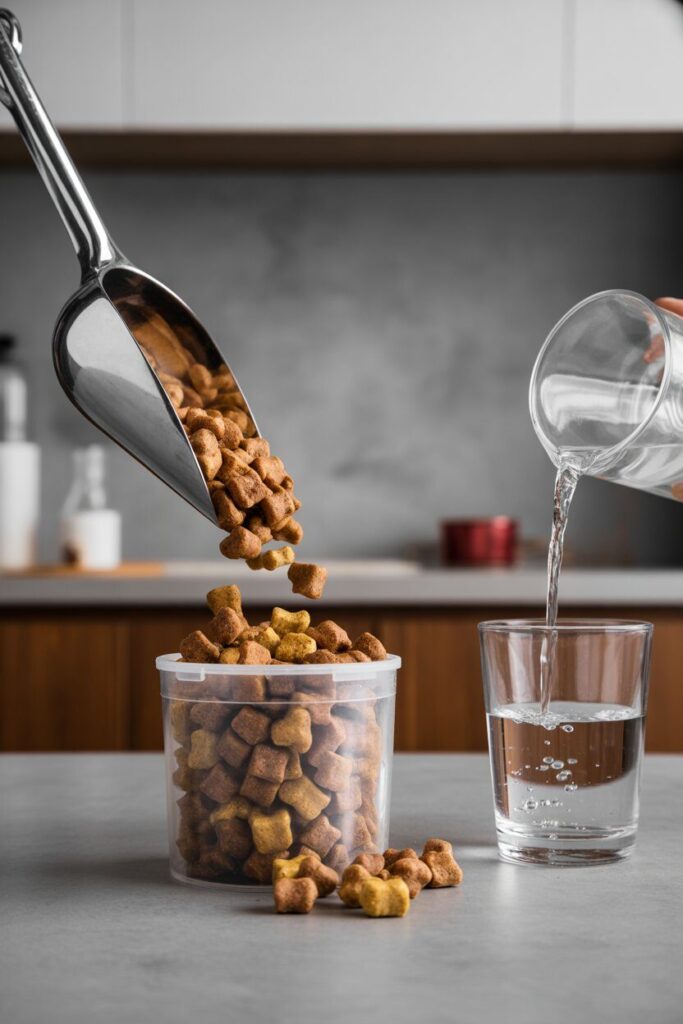
Freeze-dried dog food retains most nutrients, making it a healthy choice for puppies. It can help puppies with allergies due to fewer ingredients that trigger reactions.
One benefit of freeze-dried meals is their long shelf life. They are easy to store and prepare quickly, making them convenient for busy pet owners who want their puppies to eat well.
Freeze-dried dog food also comes in various flavors, appealing to picky eaters. This variety makes mealtime more fun for puppies while ensuring they get essential nutrients.
Offer your pup convenience and freshness with freeze-dried meal options available on Amazon
Canned Food
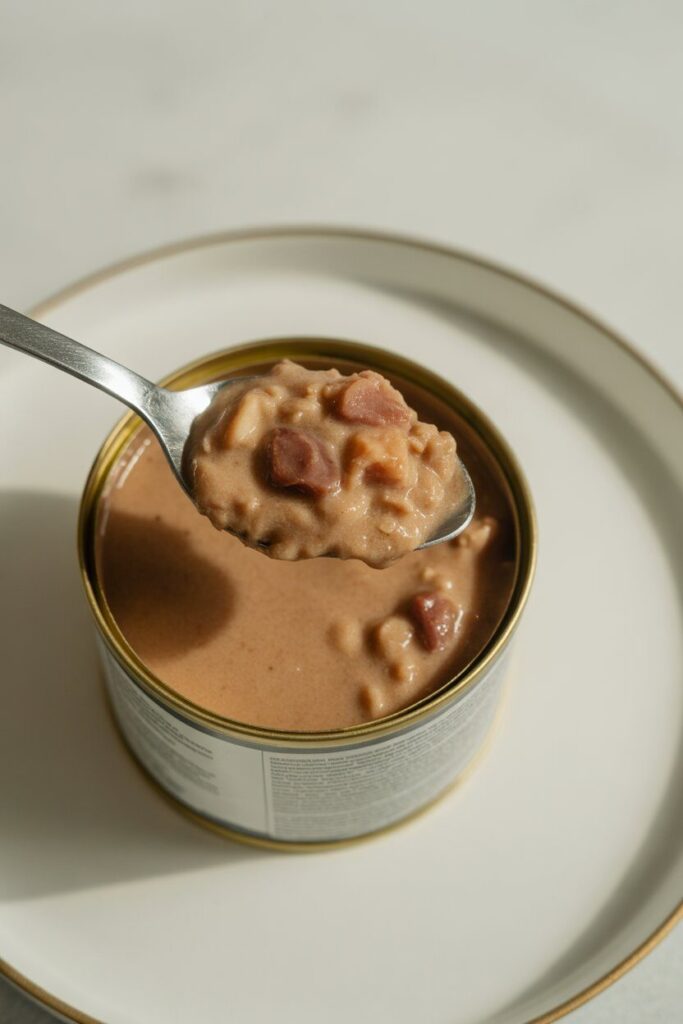
Canned dog food is easier for puppies with allergies to digest. It often has fewer preservatives, which can benefit puppies with sensitive stomachs. This food offers a more natural diet with fewer artificial additives.
One big plus is its high moisture content. This helps keep puppies hydrated, which is important since young dogs may not drink enough water on their own.
Canned food typically has more real meat and fewer fillers than dry food. This means it provides higher quality protein, essential for a puppy’s growth and development. Always check the ingredients to ensure you’re choosing the best food for your puppy.
Add variety and moisture to your puppy’s diet with healthy canned food options found on Amazon
Vegetarian Options
Vegetarian dog food can help with allergies by removing common animal allergens. This food uses plant-based ingredients that are less likely to cause reactions. It’s a safer choice for sensitive puppies.
Switching to vegetarian dog food can also aid a puppy’s digestion. Plant-based diets are usually easier to digest. This can promote better health and reduce issues like bloating and gas.
Many vegetarian dog foods are fortified with essential nutrients. They ensure puppies receive a balanced diet. These foods often include vitamins, minerals, and proteins from lentils, peas, and quinoa. This supports healthy growth and development.
Support a plant-based diet with balanced vegetarian puppy foods available on Amazon
Hydrolyzed Protein
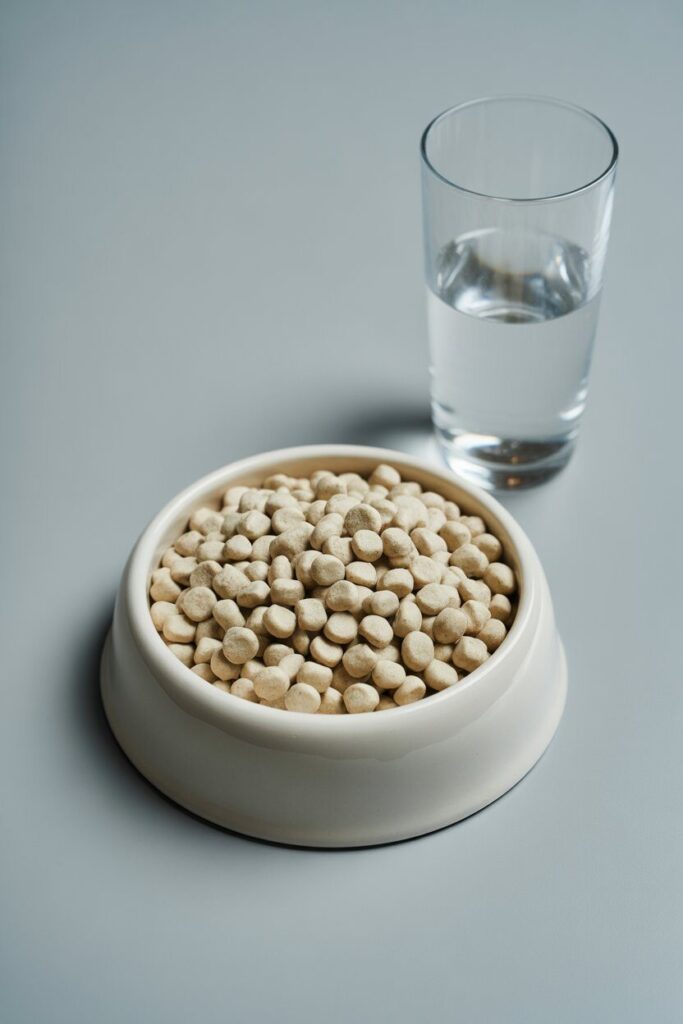
Hydrolyzed protein dog food breaks proteins into smaller parts. This makes it easier for puppies to digest and lowers allergy risks. It is often recommended for dogs with sensitive stomachs or food allergies.
For growing puppies, this food offers essential nutrients without causing allergic reactions. It’s especially helpful for pet owners wanting to avoid common allergens like beef or chicken.
Veterinarians often recommend hydrolyzed protein diets for puppies with itchy skin or digestive problems. This specialized food promotes overall health by stopping the immune system from overreacting to certain proteins. This way, your puppy stays happy and healthy.
Reduce allergic reactions and support easy digestion with hydrolyzed protein formulas from Amazon
Holistic Blends

Holistic dog food uses natural ingredients to boost health and reduce allergy symptoms. These blends focus on whole, nutritious components. They help keep a healthy coat and digestive system, making them ideal for puppies with sensitive stomachs.
These foods offer balanced nutrition. They ensure puppies receive essential vitamins and minerals for growth and development. With high-quality proteins and grains, holistic blends support better energy levels and a strong immune system.
Holistic blends often skip common allergens like wheat, soy, and corn. These ingredients can cause reactions in some dogs. Instead, they use wholesome alternatives like brown rice and sweet potatoes, making them a good choice for puppies needing a gentle diet.
Provide well-rounded nutrition with holistic puppy food blends designed for sensitive pups, available on Amazon
Probiotic-Infused
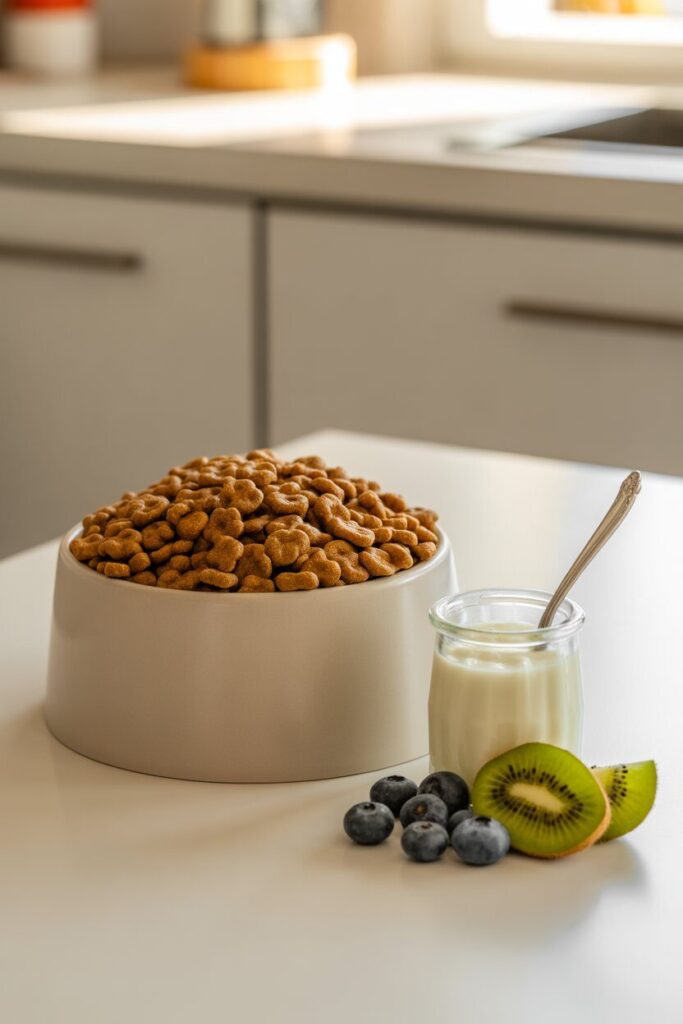
Probiotic dog food helps keep good bacteria balanced in your puppy’s gut. This balance is key for digestion and overall health.
Adding probiotics to your puppy’s diet may help with allergies. A healthy gut boosts your dog’s immune response, reducing allergic reactions.
Probiotic dog food usually has natural ingredients that aid digestive health. This can mean fewer stomach issues and a happier, more active puppy.
Boost your puppy’s gut health and immunity with probiotic-infused meals available on Amazon
Veterinary Formulas
Veterinary formulas are made for puppies with severe allergies. These special diets help lessen allergic reactions and are often recommended by vets for better health.
These formulas use unique ingredients to limit exposure to common allergens. This way, puppies receive the nutrition they need without causing allergy flare-ups.
These formulas are available only through veterinary consultations. They fit into a complete care plan for puppies, targeting specific health issues while ensuring balanced nutrition.
Get professional-grade care at home with veterinary-approved puppy food formulas found on Amazon
Small Breed Specific

Small breed puppies have special dietary needs. They need more calories per pound than larger breeds because of their faster metabolism. Choosing the right food can help with allergies and support their growth.
Feeding them food made for small breeds can also help their dental health. Smaller kibble is easier to chew and reduces plaque buildup. This promotes better oral hygiene.
Many small breed dog foods contain omega-3 and omega-6 fatty acids. These are important for a healthy coat and skin. They also support overall well-being and lower the risk of skin allergies.
Choose perfectly portioned nutrition with small-breed puppy foods made for allergy-prone pups, available on Amazon
Conclusion
Choosing the right food for your allergic puppy is key to their health. Our list of 15 affordable options provides various choices to meet different needs.
Picking the right food can help manage your puppy’s allergies and support their growth. Always check with your vet for tailored advice.
What Are the Signs of Food Allergies in Puppies?
Common signs of food allergies in puppies are itching, skin redness, ear infections, and digestive issues like diarrhea or vomiting. These symptoms can show up soon after eating and may be confused with other health problems.
If your puppy seems uncomfortable, especially after meals, check their diet. Food allergies can develop over time, so familiar ingredients might be the issue.
Can I Give My Puppy Grain-Free Food Every Day?
Yes, many puppies thrive on grain-free food if it’s balanced and complete. These diets often use sweet potatoes or legumes instead of grains. They can also be easier for some dogs to digest.
However, watch how your puppy reacts to the food. If you see better digestion or healthier skin, that’s a positive sign. Always consult your vet before sticking to any diet long-term.
How Do I Transition My Puppy to Allergy-Friendly Food?
Mix a small amount of the new allergy-friendly food with your puppy’s current food. Gradually increase the new food over 7 to 10 days. This method helps your puppy adjust without digestive issues.
Sudden changes can cause vomiting, gas, or a refusal to eat. A slow transition allows your puppy’s stomach to adapt well, especially when switching to hypoallergenic or limited-ingredient diets.
Are Vegetarian Diets Safe for Allergic Puppies?
Vegetarian dog foods can be a safe choice for puppies with severe meat allergies. These foods use plant-based proteins like lentils, peas, or quinoa. They are often fortified to meet nutritional needs.
Not all puppies do well on a vegetarian diet, but many thrive with a high-quality formula. Always check that the food meets AAFCO standards and provides essential nutrients for healthy growth.
What Should I Look for in Hypoallergenic Puppy Food?
Seek formulas that skip common allergens like chicken, beef, dairy, and wheat. Use ingredients with novel proteins such as duck or venison. Include carbohydrates like sweet potato or brown rice.
Also, ensure the food has no artificial additives or fillers. A quality hypoallergenic dog food supports skin health, digestion, and immune function while reducing allergic reactions.
